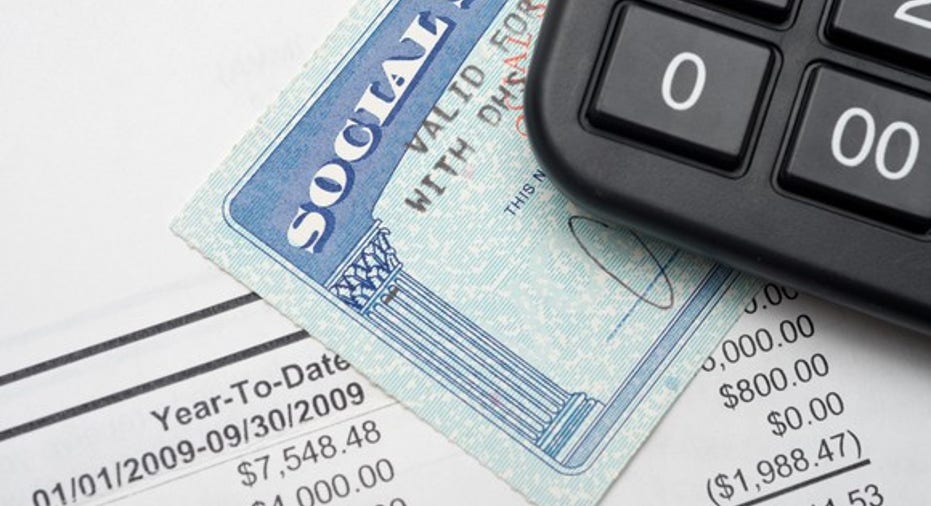Will You Have to Pay Taxes on Your Social Security Benefits?

Once you're retired and no longer earning wages, it'd be nice if taxes were also a thing of the past. Unfortunately, you may not be able to leave your tax bill behind along with your job. In fact, oneSocial Security administration studypredicted that an average of 56% of beneficiary families would pay taxes on their Social Security benefits between 2015 and 2050.
Why Social Security is taxable
Once upon a time, Social Security benefits were completely tax-free. Then, in 1983, President Reagan signed an amendment making up to 50% of Social Security benefits taxable. In 1993, President Clinton signed a bill that (among other things) made up to 85% of "higher income" Social Security recipients' benefits subject to taxation. Unfortunately, that bill failed to provide a method for raising the tax's income thresholds in response to inflation, so what was once a "higher income" threshold now includes a much wider range of Social Security beneficiaries.
How to find out if your benefits will be taxed
The first step in determining whether your benefits will be taxable is to compare your income to the base threshold. If you're already receiving Social Security benefits, then your annual Form SSA-1099 will tell you how much you received in benefits during the last year. If you're not yet receiving benefits, you can look at your Social Security statement and use the estimated benefit from that form. Just take the monthly estimated benefit number and multiply it by 12 to see how much Social Security money you'll be getting per year.
Next, divide your annual Social Security benefit by two. Add this number to any other taxable income you received during the year, plus tax-exempt interest earnings. The total is what's known as your "provisional income," and if it exceeds a certain threshold based on your filing status, then your benefits will be at least partially taxable:
| Filing status | Up to 50% of Benefit Taxable if Provisional Income Exceeds... | Up to 85% of Benefit Taxable if Provisional Income Exceeds... |
|---|---|---|
| Married filing jointly | $32,000 | $44,000 |
| Married filing separately (and you lived with your spouse throughout the year) | $0 | $0 |
| Other | $25,000 | $34,000 |
Image source: Getty Images.
Note that "up to" that percentage of your Social Security benefit will be taxable if your provisional income exceeds the threshold. You may be taxed on a much lower percentage of your benefit depending on the makeup of your income. To figure out how much of your benefit may be subject to taxation, check out IRS Publication 915 or simply plug some numbers into our handy calculator.
How to minimize your tax bill
Obviously, it's to your benefit to minimize how much of your Social Security will be taxed, if possible. For most retirees, it's distributions from traditional IRAs and 401(k) accountsthat push their taxable income over the threshold and cause their Social Security to be taxed. Unfortunately, you don't have complete control over how much money you take out of these accounts: The IRS requires you to take mandatory minimum distributions once you hit age 70-1/2. Your only option with traditional retirement accounts is to limit yourself to the required minimum distribution(assuming that's enough for you to live on) and hope those funds won't push you over the taxation threshold.
If you're fortunate enough to have a Roth, you're in a much better position to control your Social Security taxation.Roth distributions are not taxable income, so they don't count toward the income threshold that determines whether your benefits are taxable. And there's no required minimum distribution from Roth accounts, so you can take distributions when it makes the most sense for you and leave the rest to keep growing for as long as possible.
Planning for a low-tax retirement
Assuming you're still at least a few years from retirement, you can take steps now to minimize taxes on your Social Security benefits. If you don't already have a Roth account, now is a good time to set one up and fund it to the max. With that account plus your traditional retirement accounts, you'll be able to tinker with your distributions in such a way as to minimize your income for purposes of the Social Security taxation test. If you're already retired, consult with a tax professional for assistance in lowering your taxable income. Tax planning can do a surprising amount to help, even if you're stuck with fixed, taxable sources of income.
The $16,122 Social Security bonus most retirees completely overlook If you're like most Americans, you're a few years (or more) behind on your retirement savings. But a handful of little-known "Social Security secrets" could help ensure a boost in your retirement income. For example: one easy trick could pay you as much as $16,122 more... each year! Once you learn how to maximize your Social Security benefits, we think you could retire confidently with the peace of mind we're all after.Simply click here to discover how to learn more about these strategies.
The Motley Fool has a disclosure policy.



















